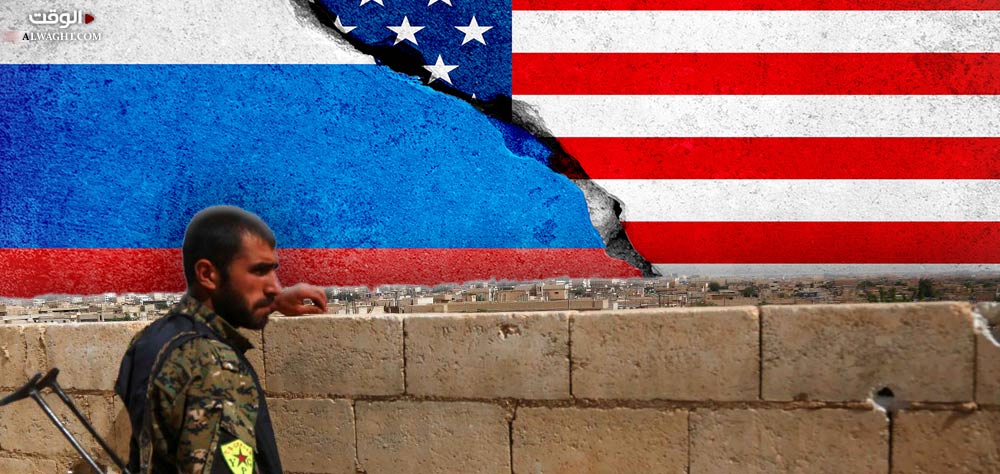Alwaght- Since Syrian independence from the French mandate in 1946 until 2011 when the conflict erupted in the country, the Syrian Kurds, a two million ethnic group, had no specific politico-social place in Syria. They were even considered Turkish migrants, and not Syrian citizens by the government. But they found the situation ripe for entry to the country’s power equations when seven years ago crisis encompassed the country and kept unfolding to date.
Before 2011, the Democratic Union Party (PYD), the Syrian branch of the Kurdistan Workers’ Party (PKK), was an underground organization. But its activities came to surface when the war broke out. The PYD led a movement towards the establishment of a federal system in Syria’s north as its fighters seized parts of Al-Hasakah, Aleppo, and Raqqa. In 2014, the Kurds declared autonomy from the central government of the three cantons of Afrin, Island, and Kobani. They caught global attention after their resistance in the same year to a heavy push of ISIS terrorist group towards the city of Kobani. The Kurds came out of the battle victorious.
The US officially inaugurated its military and political relationship with the Syrian Kurds in 2014, and sent weapons to the People’s Protection Units (YPG) as well as the Women’s Protection Units (YPJ). This partnership spawned a period of sweeping territorial expansion in the north of the country by the Kurds. ISIS defeat in the battle for Kobani ushered in wider American-Kurdish coordination on the battlegrounds.
Russia, on the other side, intervened militarily in Syria against ISIS at the behest of the Syrian government in late September 2015. While helping the Syrian President Bashar al-Assad to fight his opponents in a multi-fronted combat, Moscow stretched out its hand to the Kurds for political ties. The Kurdish response was positive. Kremlin allowed the PYD to open a representation office in the Russian capital, introducing a new equation in relation to the Syrian Kurds.
Continuing to expand territories and strength, Kurds convened in Rmeilan town in Island canton to officially announce founding the Kurdish federal region in northern Syria on 17 March 2017. Subsequently, Kurds even gained unprecedented political weight among other actors when they in mid-October seized from ISIS the city of Raqqa, the stronghold of the terrorist group and the capital of the self-proclaimed caliphate. In the past two months, the Syrian Democratic Forces, a militant alliance in which the Kurds account for about 90 percent of the fighters, managed to take control of large tracts of land in the oil-rich Deir ez-Zor province while ISIS as a terror organization was coming to an end in Syria.
Now that ISIS is finished in the country and the central government has restored major part of the territory across the county, what’s next for the Syrian Kurds? What kind of pathway will they take in dealing with such two influential powers as the US and Russia in the future? Three scenarios are expected:
1- Keeping strategic alliance with the US, moving away from Russia
The first scenario can be that the Kurds will preserve their strategic partnership with Washington. The prediction is that, due to deep divides between the US and Russia on the Syrian future, the Kurds, under Washington pressure, will have to stay on the American side and away from the Russians. A look at the field realities and the massive US aids to the Kurds makes it clear that this scenario is logical and likely. But the Kurds apparently know two things: First, the US does not back them on a perpetual basis and, in fact, the Americans at the end of the road will prefer their strategic ally in the region Turkey. And second, Russia is the only party that has so far showed a green light to the Kurdish demands like the right to have a federal regional government in the north in a post-conflict Syria. Additionally, Russia has invited the Kurds to the peace talks and to a peace congress set to be held in Sochi, despite Ankara opposition. So, they under no condition want to turn their back to the Russian patronage.
2. Allying with Moscow and forsaking Washington
Another likely scenario can see the Kurds creep towards Russians, a move requires them away from the Americans. This step might be driven by a sense of distrust in the US, and feeling that any time the Americans can sell them for a bigger advantage. They are afraid of falling victim to a Washington-Ankara agreement sooner or later. Kurds will find it a right step to move closer to Russia especially that the Syrian stage is currently dominated by the victorious government and its ally Moscow, with the Americans having little power of influencing the course of developments.
3. Balanced relations with Russia and the US
The Kurds of Syria can also take a middle way, interacting with both the Russians and the Americans within the framework of interaction with the two heavyweights whose role is decisive in the Syrian future. This can take place on the ground by continuing already-strong ties with Washington and building a stronger relationship with Moscow. This takes cultivating a compromising spirit to comply with both the American and the Russian expectations.
Either way, the Kurdish basis for making a choice is the efficiency of each scenario and the help it can give them on their way towards their goals. That means that the Kurdish leaders’ decisions are tied to the future events. With regard to the Russian power of determination on the ground compared to the US, Kurds will take into account alliance with Moscow, as they know that without Russia's green light their efforts would go nowhere. They, on the other side, will not want to abandon the American help, despite the fact that they are well aware of the reality that the US pro-Kurdish stances in Syria more instrumentally serve the American interests than those of Kurds.



























